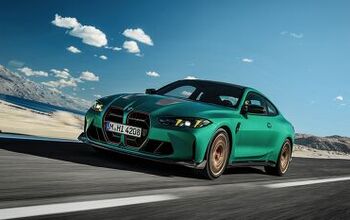J.D. Power Showers Buick and Lexus With Praise Over Service Satisfaction

J.D. Power and Associates continued its courtship of Buick and Lexus in its latest scorecard for consumer satisfaction with dealer service departments. While J.D. passes out awards around like a teacher giving PARTICIPANT ribbons at an elementary school science fair, its consumer index is a decent way to track automotive trends. In this instance, that trend is continued improvement of American manufacturers. Well, most of them.
Fiat Chrysler should sincerely consider making a large contribution to J.D. Power so it can get out of last place in literally every single category.
Meanwhile, General Motors is on its best behavior with a score of 807 out of 1,000, an improvement over last year by a full 10 points thanks to Buick taking top honors (860 points) and its other brands scoring substantially above the industry average. Buick was followed by Mini, GMC, Chevrolet and Nissan in the mass-market brand rankings.
Lexus experienced a return to glory among premium brands after a three-year gap of only being “among the best.” Before that, Toyota’s luxury arm enjoyed five-consecutive years of top honors. Lexus’ score was 874, up five points from a year earlier.
Still, even the lowest-rated premium brands managed to score well above the industry average for mass-market autos. Land Rover, which received the worst consumer feedback, garnered a score of 828. For comparison, the non-premium label on the bottom rung of service department satisfaction came in with 739. That brand, as you probably guessed, was Fiat. The rest of FCA’s brood took their usual places near the bottom of the list, with Dodge performing the least offensively.
Possibly the most useful bit of data obtained from the index was what customers liked and didn’t like when interacting with service departments. Obviously, doing the work correctly was the big x-factor. Customers forced to bring in a vehicle a second time weren’t likely to forget it. But the problem area that most centers had the most trouble getting right the first time? Center consoles and radios.
Other elements — like service advisors using tablets instead of paper — made customers feel better about the experience, and franchised dealerships were preferred to independent service shops primarily due to amenities offered, comfort of waiting areas, and overall cleanliness.
The study measured customer satisfaction of owners and lessees of 2012 to 2016 model-year vehicles serviced at franchised dealerships and independent service centers. J.D. Power surveyed more than 70,000 customers between October and December of 2016 for the latest study. The scores measure quality of service, performance of service advisers, service initiation, service facility and vehicle pick-up. Service quality was the most-improved category with a score of 809, up 27 points from 2015.
[Image: General Motors]

A staunch consumer advocate tracking industry trends and regulation. Before joining TTAC, Matt spent a decade working for marketing and research firms based in NYC. Clients included several of the world’s largest automakers, global tire brands, and aftermarket part suppliers. Dissatisfied with the corporate world and resentful of having to wear suits everyday, he pivoted to writing about cars. Since then, that man has become an ardent supporter of the right-to-repair movement, been interviewed on the auto industry by national radio broadcasts, driven more rental cars than anyone ever should, participated in amateur rallying events, and received the requisite minimum training as sanctioned by the SCCA. Handy with a wrench, Matt grew up surrounded by Detroit auto workers and managed to get a pizza delivery job before he was legally eligible. He later found himself driving box trucks through Manhattan, guaranteeing future sympathy for actual truckers. He continues to conduct research pertaining to the automotive sector as an independent contractor and has since moved back to his native Michigan, closer to where the cars are born. A contrarian, Matt claims to prefer understeer — stating that front and all-wheel drive vehicles cater best to his driving style.
More by Matt Posky
Latest Car Reviews
Read moreLatest Product Reviews
Read moreRecent Comments
- El scotto @jalop His maintenance costs are about right. Sorry about your alternative reality.
- Kwik_Shift_Pro4X Just because you don't see many of them on the road doesn't mean they go up in value. I'm sure finding parts for it will be an adventure. 🙄
- FlyerTuck My middle-aged parents (father) at the time ordered a new 1996 DeVille Concours Edition. The engine was butter smooth and could move that land yacht well. It rode well too on the highway and floated, but it couldn't handle out of its own way. My mother loved it, but my performance oriented father grew to hate it over time. He wanted something he could still whip around back roads like the sports cars he used to own before marriage. He traded it on a BMW 7-series after not even two years, and while my mother said it wasn't as comfortable and took bumps more harshly, could live with it. Something about rear wheel drive and independent suspension magic. GM just never learned.
- FlyerTuck What is amazing when you think about it is that Honda started out just a motorcycle maker during the post-WWII Reconstruction period. They've come a long way very quickly, and took out American competition that had been around twice as long.
- El scotto Stupid is as stupid does. I would imagine most car dealers only computerized when some salesperson showed them it could make/save them money. Pay for anti-virus protection and such? A waste of dealership money. BTW does anyone know if Bark Baruth has written anything on this?


































Comments
Join the conversation
I will buy a Buick when it becomes an American car. Current Buick's are engineered by Opel and Daewoo and are designed by Australians. GM does not believe in hiring Americans for white collar jobs anymore. GM hates America.
The problem here is Buick and Lexus owners can love and cherish their cars all they want but they're still Buick and Lexus owners. To me, that's like having somebody telling me that Nickelback and Adele are the greatest.